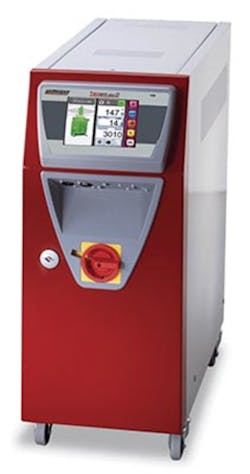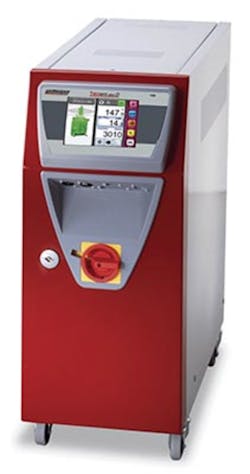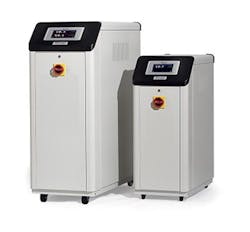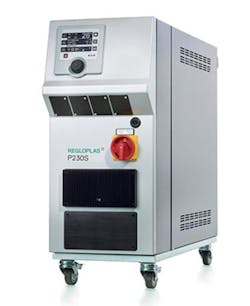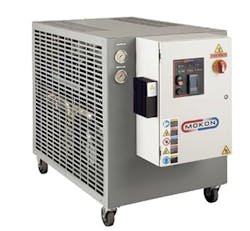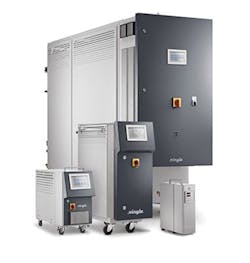Temperature Control: Temperature control units increase capabilities
New and upgraded oil- and water-type temperature control units (TCUs) are delivering greater efficiency through more accurate control.
WITTMANN WIDENS TCU OFFERINGS
Last month at Fakuma in Germany, Wittmann Battenfeld introduced a variable-speed pump motor and a frequency converter as options on its Tempro plus D250 oil-circulating TCU. The new SpeedDrive motor option can be incorporated into the TCU without changing its external dimensions.
SpeedDrive, which will be available in the U.S. next year, allows operators of the Tempro plus D250 to preset variables; the machine then can automatically adjust motor speed, pump pressure or the differential temperature without the need for additional equipment. Thus, adding the SpeedDrive option increases process reliability because it increases or reduces pump speed in response to a process change such as an increase in pump pressure due to a blockage, the company said. Because it uses a variable-speed motor, SpeedDrive can improve energy efficiency.
To achieve even greater efficiency, users also now have the ability to combine a Tempro plus D250 and SpeedDrive with Wittmann Battenfeld's Flowcon plus flow regulator. A compact, automatic water distributor, Flowcon plus can provide the optimum dissipation of heat by ensuring that there is turbulence in the cooling ducts. It can regulate water volume at the optimum pressure, and control and monitor the flow rates and temperature in as many 48 individual temperature control circuits.
Earlier this year, Wittmann Battenfeld's newest model in the Tempro plus D line became available in the U.S. The Tempro plus D250 TCU represents a complete redesign of its forerunner, the Tempro plus 250.
The Tempro plus D250's noncontact heating element and upgraded cooling coil improve temperature efficiency by at least 20 percent, inside sales representative Joe Golin said. The TCU features tubular aluminum heating elements in a stainless-steel sleeve. "The heating elements do not actually touch the oil so they do not corrode as quickly compared to the previous design," Golin said.
The new heat exchanger consolidates the number of heater pipes used to condition the oil from six to one.
"All of the oil now passes through a single heater unit before flowing out to the mold. Heating is faster and more uniform with this approach," Golin said. New sealing material and a new stainless-steel cooling coil replace a coated-copper-ribbed heater.
The new unit has a 6.3-gallon oil tank. The previous model had a 1.7-gallon oil tank. However, the overall dimensions of the unit are only slightly increased lengthwise, from 36.4 inches to 39.4 inches, even with the larger oil tank.
FRIGEL UPGRADES CONTROLS
Frigel said that an advanced control technology it announced last year for its Microgel press-side chiller/TCU is now commercially available, following a long testing period. The Microgel has a chiller and two TCUs incorporated into a single cabinet, said Al Fosco, global marketing manager for Frigel.
The control technology is based on a control platform Frigel implemented on its Ecodry closed-loop, adiabatic central cooling systems in 2015. "The new control concept for Microgel is based on the same platform as the 3PR incorporated into the Ecodry central system, but it is a machine-dedicated system. This digital control takes the same concept on an onboard basis," Fosco said.
The 3PR provides more information compared to the previous controller.
"With the previous control, the user could only see what was occurring with the unit in that moment. All process data could not be stored, except for alarm logs," Fosco said.
The updated control allows users to capture an hour's worth of data pertaining to temperatures, pressures, flow rates and energy use.
"For the first time, a user can plot energy usage over a period of time, calculating the energy consumption used to produce the part. The molder can see exactly how much energy the compressor used or how much energy the heater used. The user can determine how much energy was required to produce a part," he said.
A user can view historical logs showing set point and actual temperature, but also pressure drop across the mold, or the flow rate, as well as the exit pressure and return pressure in the system. When a tool and conditions have been tweaked to produce a part at optimal molding conditions, those operating parameters can be captured. "A user may discover that a 5-ton chiller can be used with an application instead of a 10-ton chiller, which can then be moved to another application," he said.
Wi-Fi and Ethernet connectivity for the Microgel line will become available early next year. Users will be able to monitor the equipment and troubleshoot it remotely. The alarm logs will be updated so that customers accessing an alarm remotely will get an explanation of what happened, and the software will suggest a solution to the problem.
"If a valve did not close, or a connection was improperly administered, or an issue with the condenser supply arose, a possible correction will be suggested by the software itself," Fosco said.
Frigel has added this 3PR control concept to each Microgel model.
CONAIR ROLLS OUT NEW OPTIONS FOR ITS TCUs
In September, Conair launched new options for its Thermolator TW series of water-circulating TCUs.
TCUs in the series now can be constructed with a cast-bronze pump housing — rather than epoxy-coated steel — and a stainless-steel pump impeller. This non-ferrous construction option offers a significant performance upgrade, Conair said.
The series is offered in three variations, including the Premium (TW-P), Standard (TW-S) and Value (TW-V) product models. The TW-V model is a preconfigured unit that is available with a choice of two pump sizes and no options. The TW-S and TW-P units have the same basic mechanical design but are available in more pump sizes and offer a higher level of customization.
The Thermolator TW-P series and TW-S series are offered in closed-circuit (where the process water and cooling water are completely isolated) and direct-injection configurations, in single- or dual-zone designs, and handle temperatures from 4 degrees Fahrenheit to 150 degrees Fahrenheit. Seven pump sizes range in pumping capacity from 50 gallons to 150 gallons per minute. The company offers solid-state relay heater controls with modulating flow-control valves as an alternative to conventional solenoid valves. The optional modulating valve is designed to open only far enough to provide proper cooling for the process load, without the drastic temperature swings that can occur with a solenoid valve, Conair said.
REGLOPLAS WATER UNITS HANDLE HIGHER TEMPERATURES
Regloplas developed a new version of its P230S pressurized-water TCU with higher temperature capability. The TCU incorporates a new high-speed PM23H pump, designed with 1.43 horsepower (hp) to deliver flow rates up to 10 gallons per minute with a maximum pressure of 73 pounds per square inch (psi). It offers heating capacity up to 8 kilowatts (kW) and cooling capacity up to 83 kW, said Brian Pruitt, North American sales manager for plastics and medical. The unit offers temperature control up to 446 degrees Fahrenheit, while the prior version offered temperature control up to 392 degrees Fahrenheit.
Other features include a patented low-scale cooling system, a leak-free pump with magnetic coupling that separates the pump from the cooling circuit for extended pump life, and a solid-state relay rather than a heating contactor for process reliability. The unit is equipped with the easy-to-use Regloplas RT100 control system that provides access to numerous built-in options, including the ability to start multiple TCUs from a designated master unit.
MOKON EXPANDS DURATHERM MAX LINE
Mokon expanded its Duratherm Max line of TCUs with a new, lower-temperature series designed to provide an alternative to oil or steam systems.
The new D3 series of Duratherm Max water systems fills the gap for customers with temperature requirements over 300 degrees Fahrenheit that do not need the capabilities of the D4 series, designed for temperature requirements up to 380 degrees Fahrenheit, said Rob Kennery, VP of sales and marketing.
The D3 can cool molds as hot as 330 degrees Fahrenheit, with an option for 340 degrees. The company offers the unit with pump sizes ranging from 1.5 hp to 3 hp, offering flow rates and pressures from 25 gallons per minute at 39 psi to 60 gallons per minute at 4 psi. Heating capacity ranges from 9 kW to 48 kW, depending on the application.
Other features include an epoxy-powder-coated cabinet, solenoid valve, a stainless-steel seal-less magnetic drive turbine pump, stainless-steel impeller, and suction and discharge pressure gauges.
In addition, the TCU uses a microprocessor-based controller mounted to an easily accessible panel that has dual displays indicating the temperature set point of the process fluid and the actual temperature.
SINGLE TEMPERATURE CONTROLS
Earlier this year, Single Temperature Controls (STC) introduced its Modular line of self-adjusting TCUs.
Offered with a choice of water or oil as a coolant, the compact units are available in a range of sizes, with flow rates from 27 liters per minute to 100 liters per minute. Water versions in the line handle temperatures of up to 392 degrees Fahrenheit, while the oil units are appropriate for temperatures as hot as 572 degrees Fahrenheit. No matter the flow rate, units in the line maintain temperature to within 1 degree Fahrenheit, said Fred Hagberg, VP of the company's North American operations.
Hagberg emphasized the units' energy efficiency. "Our TCUs do not just run blindly at one setting or speed, however, [they] self-adjust to ensure the exact amount of heat/cooling energy is transferred into the process," he said.
Compared to other units, they require much less energy, resulting in savings of up to 70 percent, Hagberg said. "Our TCUs have the power necessary to ramp up a process quickly; however, [they] have the control to throttle down when not all the power is needed," he said. Because the pump and motor can shift down during lower-demand cycles, such as when an injection mold has heated up but before it needs to be cooled down, the TCUs last longer, the company said.
For optimal performance and flow rates, the TCUs feature a high-pressure centrifugal pump that provides a consistent, predictable flow of the heat-transfer medium. "This flow rate can also be controlled to enhance process efficiencies, which typically leads to better part quality," Hagberg said.
The units have a 7-inch touch display, where operators can see at a glance data about parameters such as flow rates, process pressure and temperature, as well as alarm conditions.
Mikell Knights, senior staff reporter
For more information
Conair Group,Cranberry Township, Pa., 724-584-5500, www.conairgroup.com
Frigel North America Inc.,East Dundee, Ill., 847-540-0160, www.frigel.com
Mokon,Buffalo, N.Y., 716-876-9951, www.mokon.com
Regloplas Corp.,St. Joseph, Mich., 269-428-1100, www.regloplasusa.com
Single Temperature Controls Inc.,Charlotte, N.C., 704-504-4800, www.single-temp.com
Wittmann Battenfeld Inc.,Torrington, Conn., 860-496-9603, www.wittmann-group.com
